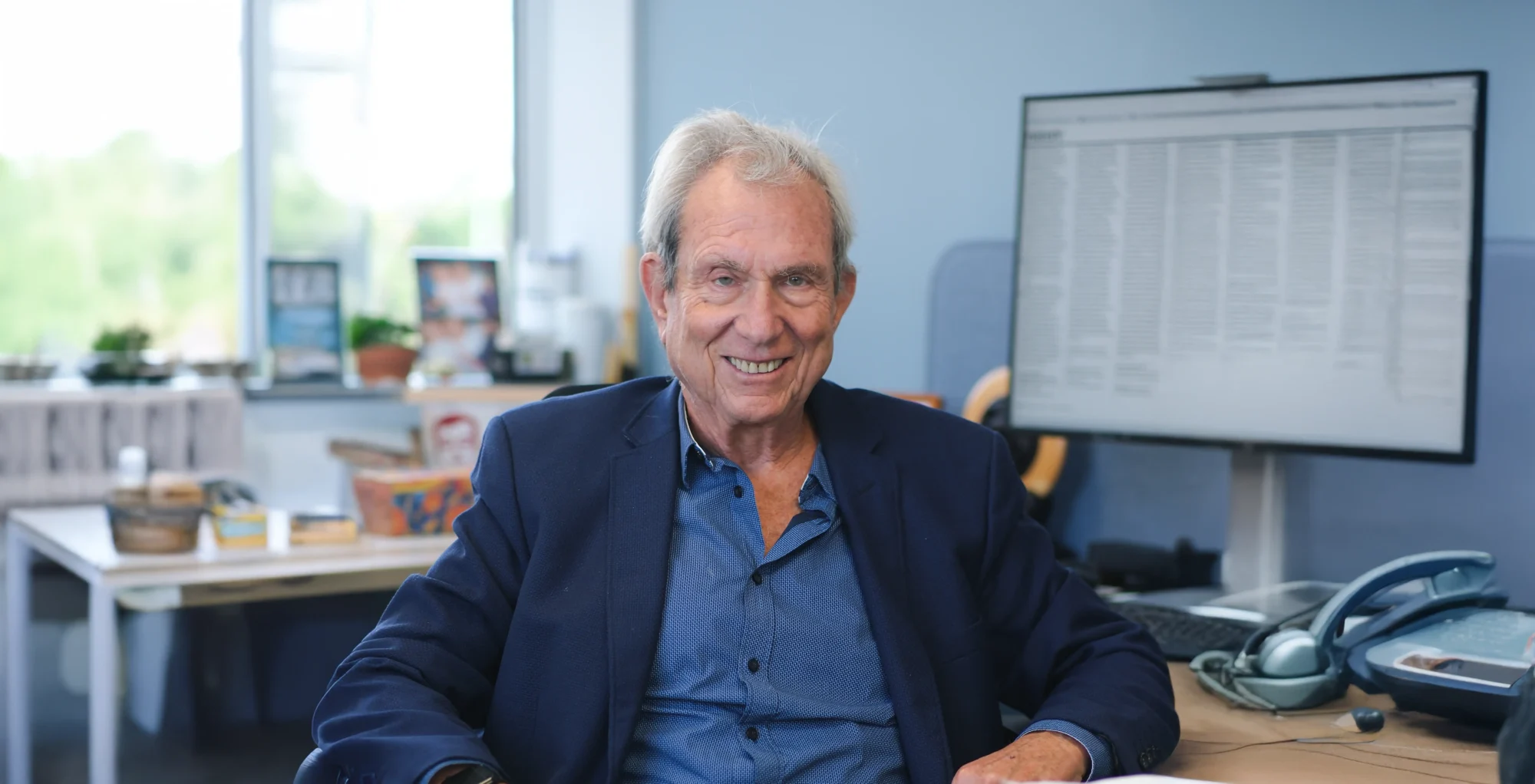Karin will direct the Center for Metabolic and Liver Diseases, continuing his studies on how the healing process of injury and inflammation can go haywire and promote cancer.
Michael Karin, PhD, has long been fascinated by what happens when inflammation—ideally a short-term burst of biological activity to promote healing or fight infection—turns chronic and potentially deadly.
He joined Sanford Burnham Prebys on June 30, 2025, where he will continue investigating how chronic inflammation can promote tumor formation. Karin also will serve as director of the new Center for Metabolic and Liver Diseases.
“Michael is a key leader in the molecular mechanisms that underlie metabolism, inflammation and cancer, and his recruitment to our institute is transformational,” said David A. Brenner, MD, president and chief executive officer of Sanford Burnham Prebys. “Michael is dedicated to transforming his research into improved human health.”
Prior to joining the institute, Karin was a distinguished professor of Pharmacology and Pathology and the Ben and Wanda Hildyard Chair for Mitochondrial and Metabolic Diseases at the University of California San Diego. He served on the faculty there for nearly 40 years.
Karin’s work on the links between chronic inflammation and cancer is internationally renowned. He discovered the key inflammation supporting IKK-NF-kB and JNK-AP-1 signaling pathways and has published seminal work regarding how chronic inflammation can prevent cells from being constrained by the normal checks and balances of programmed cell death, or apoptosis.
Ignoring apoptosis to grow without limits can inch cells toward becoming cancerous, and Karin has illuminated how inflammation pushes cells in this direction. He has uncovered connections among metabolic stress, inflammation and immunosuppression in cancer, providing the foundation for using anti-cytokine and anti-inflammatory drugs to prevent and treat cancer.
Karin discovered that signaling molecules in the interleukin-6 family—known to stimulate inflammation and autoimmunity in many diseases—could abnormally activate proteins governing gene expression to make them cancer-promoting, leading to colorectal and liver cancers, as well as other malignancies. He also detailed how the I-kappa B (IkB) kinase complex (IKK) contributes to colon, liver and prostate cancers by activating the immune and inflammatory response nuclear factor kappa B (NF-κB) to increase expression of anti-apoptotic and growth-promoting genes.
In recognition of his scientific achievements, Karin has garnered many prestigious awards, including: the American Association for Cancer Research (AACR) G.H.A. Clowes Award for Outstanding Basic Cancer Research (2020); the William B. Coley Award for Distinguished Research in Basic and Tumor Immunology (2013); the Charles Rodolphe Brupbacher Prize for Cancer (2013); the Harvey Prize for Human Health (2010); and the Morton I. Grossman Lectureship (2003). He was elected a member of the U.S. National Academy of Sciences in 2005, the National Academy of Medicine in 2011 and as an associate member of the European Molecular Biology Association in 2007.He is also an elected member of the AACR Academy.
Karin assumes leadership of the Sanford Burnham Prebys Center for Metabolic and Liver Diseases at an important time due to the rising prevalence of metabolic disorders in the U.S. and around the world. One in three American adults is affected by the metabolic syndrome, a group of conditions that includes coronary heart disease, diabetes and stroke. Liver disease is equally prevalent. It’s estimated that 30% of adults in the U.S. have metabolic-dysfunction associated steatotic liver disease (MASLD) and 5-10% have the more severe form called metabolic-dysfunction associated steatohepatitis or MASH, which can lead to scarring (cirrhosis), liver cancer and organ failure.
As director, Karin will lead collaborations among seven laboratories focused on identifying and interpreting the underlying causes and drivers of metabolic and liver diseases. Experts in these labs and their collaborators work on research that includes basic intracellular signaling, metabolic translational research, human physiological studies and clinical trials. Current therapeutic options for metabolic and liver diseases are limited, ineffective or don’t exist at all, and Karin will spearhead the center’s efforts to find new treatments for millions of patients.
“After spending nearly 40 years of highly productive research at UC San Diego, I am excited about assuming my new responsibilities at Sanford Burnham Prebys,” said Karin. “MASLD has become one of the most critical public health problems and its treatment will add billions of dollars to our healthcare-related expenditures.
“While my new Sanford Burnham Prebys colleagues continue cutting-edge research on the pathogenesis of MASLD, I am looking forward to the initiation of novel translational efforts towards the prevention and interception of MASLD and its more severe complications.”
Karin has published hundreds of manuscripts throughout his career, including many in esteemed journals such as Nature, Cell, Science, Cancer Cell, Immunity, Cell Metabolism and Nature Immunology. His work has been cited more than 360,000 times with an h-index of 284. He has established collaborations with Sanford Burnham Prebys faculty members, including Brenner, Peter Adams, PhD, Randal Kaufman, PhD, and Debanjan Dhar, PhD. Karin also oversees one of three research areas within a multimillion-dollar, five-year Program Project Grant awarded by the National Cancer institute to Kaufman, titled “Role of hypernutrition and metabolic stress in non-alcoholic steatohepatitis (NASH) driven hepatocellular carcinoma (HCC).” Karin focuses on understanding the role of the transcription factor nuclear factor erythroid 2-related factor 2 (NRF2) and the gluconeogenic enzyme fructose bisphosphate phosphatase 1 (FBP1) in metabolic liver diseases that progress into liver cancer.
“This program project grant is providing much needed and highly appreciated public support to my ongoing collaborations with Dr. Kaufman and other institute investigators,” said Karin. “I also look forward to continuing my collaborations with my former colleagues at UC San Diego and my friends at the Salk Institute for Biological Studies.”
